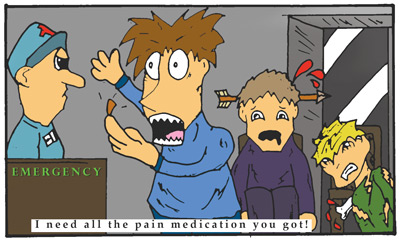Wartime nurse shortage leaves lesson
By Jesse Hove
Faith Columnist
Being in pain sucks, but feeling no pain at all is even worse. According to Paul Brand, from his book 1997 book The Gift of Pain, leprosy is one of the worst infectious diseases you can have for both physical and social reasons. It is even worse when the patients experience the side effect of not feeling the physical pain.
“For the painless, danger lurks everywhere. A larynx that never feels a tickle does not trigger the cough reflex that warns of pneumonia. Bone joints deteriorate because there is no whisper of pain encouraging a change in position, and bones begin to grind against each other,” wrote Brand.
Brand worked as a surgeon in the Second World War, and received several honours, including the Commander of the Order of the British Empire in 1961.
After the war, he went on to study leprosy before taking up a teaching position at the University of Washington until his death in 2003. Right until the end, Brand maintained that pain was not the enemy, but the loyal scout announcing the enemy. Brand expressed his concern that society was becoming increasingly dependent on drugs rather then seeing pain as a useful tool in discovering the greater problems that occur both mentally, spiritually and physically within ourselves.
In his book he cited an example from the Second World War where only one in four soldiers with serious injuries asked for morphine, though it was freely available. Today 80 per cent of those recovering from less-serious injuries ask for morphine or other narcotics. Brand concludes that the majority of the soldiers felt no need for the narcotics, because they felt community with one another and were relieved to be alive.
Brand cited another example during that war where an emergency call-up of medical staff sends a large segment of the hospital workers to the front lines. Patients were forced to work duties usually reserved for nurses. Every patient who could walk, and a few who could only push their wheelchairs, fetched bedpans, changed sheets, and distributed food and water. The demand for pain medication dropped by 50 per cent, and those who usually needed sleeping pills were now peacefully asleep. Once nurses had returned to the hospital, dosages almost immediately went back up.
I wonder if we don’t experience something similar in our society. We go to work to or school only to zone out and kill the rest of our night playing video games or watching TV. Then when we head off to sleep and wonder why we feel lonely and dissatisfied with our lives. We lose what it means to share our lives.
When we are participating in a community we get to feel the ups and down of each other’s lives. We receive fulfilment because we are no longer living for ourselves. When we experience pain we are able to share it. Even if we ourselves aren’t experiencing anything of significance, we are able to mourn with and comfort those who are. The relationship has value for both participants.
Brand concluded that those in the health profession should not be there just to offer drugs and bandages. By “standing side-by-side with patients and families in their suffering we are providing another profound form of treatment.” How can we act out this philosophy in our own lives?






